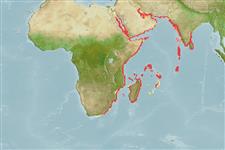Elasmobranchii (tubarões e raias) (sharks and rays) >
Rhinopristiformes (Shovelnose rays) >
Rhinidae (Wedgefishes)
Etymology: Rhynchobatus: Greek, rhingchos = snout + Greek, batis, -idos = a sting ray (Raja sp.) (Ref. 45335).
More on author: Forsskål.
Environment: milieu / climate zone / depth range / distribution range
Ecologia
marinhas; estuarina associadas(os) a recifes; intervalo de profundidade 1 - 75 m (Ref. 106604). Tropical; 35°N - 35°S, 22°E - 83°E
Western Indian Ocean: restricted to the Red Sea and the tropical western Indian Ocean to South Africa. Also reported from Persian Gulf (Ref. 68964). Apparently misidentified with closely related species in the northern and eastern Indian Ocean and western Pacific (however, Ref. 5978 seems to present a reliable record from western Indonesia).
Comprimento de primeira maturação / Tamanho / Peso / Idade
Maturity: Lm ?, range 177 - ? cm
Max length : 310 cm TL macho/indeterminado; (Ref. 5578); peso máx. publicado: 227.0 kg (Ref. 3919)
A large guitarfish with large black eyespots on the pectoral bases, a distinctive black cross between the eyes, and rows of small white spots on the upper body; snout pointed and lower caudal lobe short (Ref. 5578). Olive-green above, white below (Ref. 5578). Mouths small and contain flattened, pavement-like teeth.
Occurs inshore and in shallow estuaries (Ref. 5578). Feeds on crabs, lobsters, bivalves, small fishes (Ref. 5578) and squids (Ref. 37816). Ovoviviparous (Ref. 50449). Takes crayfish and pilchard bait. Meat and fins sought after in Asian markets (Ref. 30573).
Ciclo de vida ou comportamento de acasalamento
Maturidade | Reprodução | Desova | Ovos | Fecundidade | Larvas
Exhibit ovoviparity (aplacental viviparity), with embryos feeding initially on yolk, then receiving additional nourishment from the mother by indirect absorption of uterine fluid enriched with mucus, fat or protein through specialised structures (Ref. 50449). With 4 young, about 43-60 cm in length (Ref. 37816), born in the summer (Ref. 3919).
Compagno, L.J.V., 1986. Rhinobatidae. p. 128-131. In M.M. Smith and P.C. Heemstra (eds.) Smiths' sea fishes. Springer-Verlag, Berlin. (Ref. 3919)
Status na Lista Vermelha da UICN (Ref. 130435)
Ameaça para os humanos
Harmless
Uso pelos humanos
Pescarias: espécies comerciais; peixe esportivo: sim; Aquário: Aquários públicos
Mais informação
ReferênciasAquaculturaPerfil para aquaculturaEstirpesGenéticaElectrophoresesHereditariedadeDoençasProcessamentoNutrientsConversão de massa
Ferramentas
Relatórios especiais
Baixar XML
Fontes da internet
Estimates based on models
Preferred temperature (Ref.
123201): 24.5 - 29.3, mean 27.1 °C (based on 304 cells).
Índice de diversidade filogenética (Ref.
82804): PD
50 = 0.5049 [Uniqueness, from 0.5 = low to 2.0 = high].
Bayesian length-weight: a=0.00372 (0.00166 - 0.00830), b=3.11 (2.91 - 3.31), in cm total length, based on LWR estimates for this (Sub)family-body shape (Ref.
93245).
Nível Trófico (Ref.
69278): 3.6 ±0.6 se; based on diet studies.
Resiliência (Ref.
120179): Baixo, tempo mínimo de duplicação da população 4,5 - 14 anos (Fec assumed to be <100).
Prior r = 0.28, 95% CL = 0.16 - 0.48, Based on 1 stock assessment.
Fishing Vulnerability (Ref.
59153): Very high vulnerability (90 of 100).
Climate Vulnerability (Ref.
125649): High to very high vulnerability (71 of 100).
Nutrients (Ref.
124155): Calcium = 7.69 [1.43, 29.34] mg/100g; Iron = 0.324 [0.076, 0.901] mg/100g; Protein = 19.9 [17.7, 22.1] %; Omega3 = 0.0794 [, ] g/100g; Selenium = 43.4 [12.2, 120.5] μg/100g; VitaminA = 20.3 [6.7, 58.7] μg/100g; Zinc = 0.733 [0.359, 1.509] mg/100g (wet weight);
